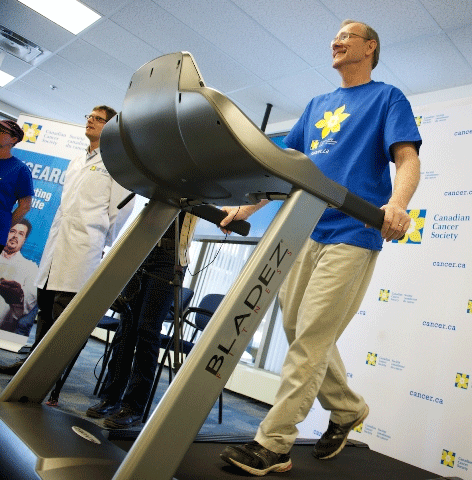
Exercise may increase the survival rate of high-risk cancer survivors who’ve recently completed surgery and chemotherapy.
A Canadian-led groundbreaking study into the prevention of colon cancer recurrence could potentially change the way cancer is treated by adding exercise to standard treatments. But more participants are needed.
“Is it possible that exercise can prevent cancer from recurring? That’s what we’re hoping to discover in the CHALLENGE trial,” says lead researcher Dr Chris Booth, an oncologist at Kingston General Hospital and associate professor at Queen’s University.
This is an important study because if solid evidence shows that prescribing a structured exercise program increases survival and improves quality of life, the results will benefit both cancer patients and the health care system. A personal trainer is much less expensive than cancer drugs.
The CHALLENGE clinical trial aims to enroll close to 1,000 high-risk colon cancer survivors who have recently completed treatment with surgery and chemotherapy.
Each participant will be followed for three years to discover whether exercise boosts survival rates
The participants will be divided at random into two groups. Both groups will be monitored closely for cancer recurrence with CT scans and surveillance colonoscopy and provided with health education materials.
The participants in one group will also work with a physical activity consultant to design an exercise program, which could include anything from walking on a treadmill to aerobics depending on their fitness and interests. The goal is for the participants to increase and maintain their level of activity by 150 minutes a week from what they were doing before the study.
Patients in the other group can exercise if they wish but are not provided with a physical activity consultant. Each participant will be followed for three years to discover whether exercise boosts survival rates.
About 40% of patients with stage 3 colon cancer relapse and die from the disease
Patricia Bogstad, 80, was diagnosed with colon cancer in 2008. She completed surgery and chemotherapy treatments in 2009 and has been participating in the CHALLENGE trial since 2010. As a participant, Bogstad has regular CT scans and colonoscopy. She also works with a CHALLENGE study physiotherapist who designed an exercise program for her.
“Participating in the clinical trial motivates me to continue with my regular exercise routine and healthy living. It makes me more accountable and more committed to living a balanced life,” says Bogstad. “I hope that the research will prove that regular exercise and a balanced diet have tremendous health benefits, at any age. More importantly, I hope that it will prove that fitness can help keep cancer away.”
Colon cancer is the third most common cancer and the second leading cause of cancer death in Canada. About 40% of patients with stage 3 colon cancer relapse and die from the disease.
The trial recruited its first patient in 2009 and is global in scope, drawing participants from 20 centres across Canada as well as 26 in Australia and three in Israel. In Ontario, the sites include cancer centres in Kingston, Ottawa, London, Hamilton, St Catharines, Kitchener-Waterloo, Mississauga, Newmarket and Toronto.
To learn more about the CHALLENGE clinical trial and how to enroll, contact the Canadian Cancer Society at 1 888 939-3333 or info@cis.cancer.ca for more information.
 TheBulletin.ca Journal of Downtown Toronto
TheBulletin.ca Journal of Downtown Toronto

